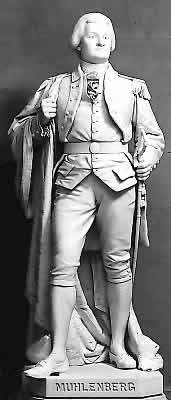Peter Muhlenberg
In 1763, along with his brothers, Frederick Augustus and Gotthilf Henry Ernst, he was sent to Halle, where they were educated in Latin at the Francke Foundations.
He briefly served in the British Army's 60th Regiment of Foot,[3] and also served for a short while in the German dragoons, earning the nickname "Teufel Piet" (Devil Pete) before returning to Philadelphia in 1767, where he was given a classical education from the Academy of Philadelphia (the modern University of Pennsylvania).
Muhlenberg was made a brigadier general of the Virginia Line and commanded that Brigade in Nathanael Greene's division at Valley Forge.
Muhlenberg's Headquarters', [9] assigned by Washington during the 1777-1778 Winter Encampment [10] at Valley Forge, is now known as the Moore-Irwin House [11] in King of Prussia, PA, and was also the estate Washington wrote in his diary of [12] visiting with other Founding Fathers Gouverneur Morris and Robert Morris during a rare break in the 1787 Constitutional Convention in Philadelphia.
They held the right flank and manned the two trenches built to move American cannons closer to Cornwallis' defenses.
On October 14, 1788, the minutes of the Executive Council report that Muhlenberg had left Philadelphia without tendering his resignation—why his resignation was needed or expected is not noted—so a messenger was sent after him.
That night, after the messenger returned with the resignation, the Council met at President Benjamin Franklin's home to choose Muhlenberg's successor, electing David Redick to the position.
[16] Muhlenberg was elected by the legislature to the U.S. Senate on a second ballot in February 1801 over George Logan, but resigned on June 30 of that same year.
On August 3, 1805, Muhlenberg wrote a letter to the residents of the primarily-German Northampton and Berks counties in a successful attempt to tilt those counties toward incumbent Governor Thomas McKean, who, in the midst of a badly fractured state Republican Party, was running with Federalist support, in his bid for reelection.
Muhlenberg noted that although McKean's opponent, Simon Snyder, was of German descent, his election would elevate the Republican Party's radical Democratic faction to power and, with calls for a Constitutional Convention to elevate the power of the state legislature over the governor and especially the judiciary, result in anarchy.


